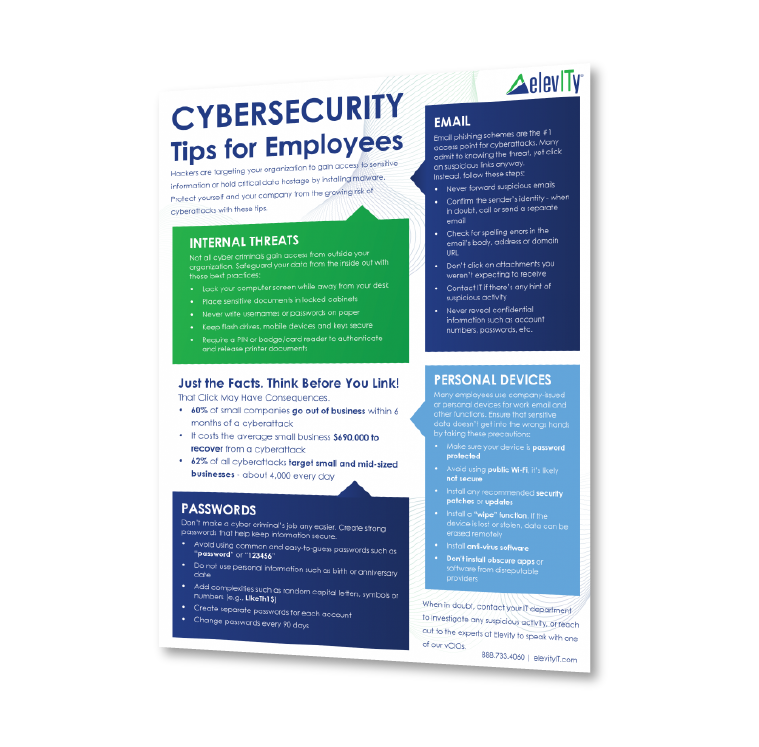According to the U.S. Environmental Protection Agency, an estimated 30 to 40 million PCs are destined for “end of life management” each year. Planning today for the full lifecycle of your computer equipment could help lessen the environmental burden of your company’s electronic product waste in landfills.
Are the PCs at your business running slower than they used to? Are technology hassles causing an increase in network downtime and reducing employee productivity?
If you answered “Yes,” it might be time to replace your office computers. In fact, information technology (IT) experts recommend replacing business computers every three to five years for an optimal balance of cost and performance.
A Technology Management Provider’s (TMP) offerings aren’t limited to selecting optimized hardware and software. TMPs also help business owners identify responsible ways to recycle or dispose of e-waste.
RELATED: Is Fully Managed IT or Co-Managed IT Right for My Business?
What is e-Waste?
E-waste is any type of obsolete or broken electronic technology. The majority of e-waste in the United States is often dumped into landfills rather than recycled.
Why Is It So Hard To Recycle Office Electronics?
Today’s office environments and remote workspaces are filled with electronics such as computers, keyboards, speakers, headsets, network servers, monitors, room-sized display screens and phones.
In order to properly recycle e-waste, special handling or other processes may be required to allow a recycling facility to break down a machine into its component parts such as CPUs, motherboards, circuit boards, sound cards, fans, keys, ports, monitors, and more.
It’s a hassle. It’s labor-intensive, which can drive up disposal costs. And many companies put off refreshing office tech at least in part because of the challenge of deciding what to do with the old equipment.
Computer Recycling Challenges
Rather than dump e-waste into a landfill which could leak hazardous materials into soil, many businesses (and consumers) choose to recycle e-waste as a more environmentally responsible option. As consumers demand greater transparency around sustainability, responsible e-waste disposal is increasingly important.
But recycling e-waste can be inconvenient, time-consuming and complicated by challenges:
- Collection – Decommissioning old office electronics takes planning. An office tech refresh is best completed in phases, since replacing a portion of an office computer fleet each year can help optimize a technology budget. Finding sufficient temporary storage space to collect your e-waste before sorting can also be a challenge.
- Sorting – Different types of e-waste require sorting before sending to a recycling facility. Computer hard drives should be wiped. Portable electronics may need batteries removed, etc. Even at a specialized recycling facility, the process is slow as complex electronics need to be broken down into components and sorted before recycling.
- Hazardous Materials – E-waste isn’t like everyday solid wastes. Lead, mercury and other toxic substances can make recycling e-waste difficult and dangerous. So it’s vital to use certified e-waste recycling facilities.
- Lack of E-waste Recycling Knowledge – Planning for a tech refresh takes your IT staff away from more pressing projects. It also requires a specialized skill set to prepare electronics for recycling. Look for certified and efficient recycling facilities with high-volume processing capabilities. A knowledgeable Technology Management Provider can help you locate reputable recycling facilities that will accept your e-waste.
- Cost – It can be expensive to recycle e-waste properly. Establishing a service level agreement (SLA) with a Technology Management Provider can streamline your efforts to plan a cost-effective technology refresh with fewer headaches for your internal IT team.
Computer Recycling Solutions & Service Offerings
When you recycle e-waste, you help your own business become more ecologically responsible, and you’re also helping your community address a growing environmental concern.
Thinking about recycling your used electronic office equipment? Here are some of the biggest benefits your business can expect:
- Reduce Pollutants in Landfills – Toxic materials like mercury, lead, cadmium, barium, lithium, nickel and battery acid won’t end up in a landfill. These pollutants can contaminate the soil and if they reach groundwater, could affect ponds, streams, rivers, lakes and even oceans. Responsible disposal helps protect fragile ecosystems in developing countries, too. Thanks for doing your part.
- Shrink Your Carbon Footprint – Recycling and using recycled materials reduces energy consumption. That encourages a reduction in greenhouse gas emissions. Recycling materials also helps reduce reliance on mined precious metals and rare earth minerals.
- Create Jobs in an Emerging Market – Recycling is a growing industry in the U.S., and is projected to keep growing at a rate of almost 6% per year.
- Receive Incentives – Some manufacturers offer rebates and other incentives to encourage customers to recycle.
To maximize benefits to your business, we suggest working with an experienced Technology Management Provider.
How a Technology Management Provider Can Help
Wondering where to start with your office technology refresh strategy?
A Technology Management Provider like Elevity can develop a plan and manage the project for you. In addition, Elevity is here to assist with all of your IT needs. Services include:
- Cybersecurity
- IT consulting
- Virtual CIO services
- Hyperconverged infrastructure
- Cloud services
- Project work
- Managed voice services
We’ll be your strategic advisor and partner, and together we’ll develop a complete technology roadmap for your continued success.
Take the First Step to Get Started
Request an introductory consultation and we’ll help you explore options and address your key questions and concerns. You’ll come away knowing whether a technology management plan is right for you. Contact Elevity today to schedule your consultation.
Also remember to download our free infographic to learn more about the differences between Traditional IT and Technology Management. This side-by-side comparison reveals the critical areas of technology including IT strategy, managed security, solutions and support.









